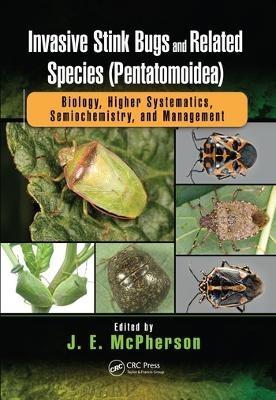
Invasive Stink Bugs and Related Species (Pentatomoidea)
CRC Press (Verlag)
978-0-367-57034-7 (ISBN)
Key features:
Presents a brief history of past classifications, a summary of present classification, and speculation on how the classification may evolve in the future
Includes keys for the identification of families and subfamilies of the Pentatomoidea and for the tribes in the Pentatomidae
Explains transmission of plant pathogens and concepts of pathology and heteropteran feeding for the non-specialist
Provides an extensive literature review of transmission by stink bugs of viral, bacterial, fungal, and protozoan organisms that cause diseases of plants
Discusses the diversity of microbial symbionts in the Pentatomidae and related species, showing how microorganisms underpin the evolution of this insect group
Reviews semiochemicals (pheromones, kairomones, allomones) of the Pentatomoidea and their vital role in the life histories of pest and beneficial species and their exploitation by natural enemies of true bugs
Covers past, current, and future control options for insects, with a focus on stink bugs and related heteropterans
The Superfamily Pentatomoidea (stink bugs and their relatives) is comprised of 18 families with over 8,000 species, the largest of which is the family Pentatomidae (about 5,000 species). These species primarily are phytophagous, and many cause tremendous economic damage to crops worldwide.
Within this superfamily are six invasive species, two that occur worldwide and four that are recent invaders in North America. Once established in new geographic regions, these species have increased their numbers and geographic distributions dramatically, causing economic damage totaling billions of dollars. Invasive Stink Bugs and Related Species (Pentatomoidea): Biology, Higher Systematics, Semiochemistry, and Management is the first book that presents comprehensive coverage of the biology of invasive pentatomoids and related true bug species and addresses issues of rapidly growing economic and environmental concerns.
Containing the contributions of more than 60 stink bug specialists from 15 countries, this book provides a better understanding of the biology and economic importance of these invasive species, why they became invasive, and how their continued geographical expansion is likely to affect numerous agricultural systems and natural environments. Including over 3,500 references, this authoritative work serves as an access point to the primary literature on their life histories, higher systematics, diapause and seasonal cycles, pathogens, symbionts, semiochemistry, and pest management control strategies for pentatomoid bugs.
J. E. McPherson is professor emeritus of zoology at Southern Illinois University, Carbondale (SIU). He obtained his Ph.D. in entomology from Michigan State University in 1968 and joined SIU in 1969 as assistant professor. He was promoted to associate Professor in 1974 and to professor in 1979. He retired in July 2012 but has continued to conduct research, maintaining the same office and laboratory space he had during his employment and still managing the entomology collection. Dr. McPherson has written broadly on the ecology and systematics of the Heteroptera, particularly the Pentatomoidea, Reduvioidea, and various aquatic and semiaquatic taxa. He has authored or co-authored 200 refereed journal articles and three books, presented papers at both national and regional meetings, and given invited lectures at various universities. He has received several research grants, primarily from the USDA Forest Service. Dr. McPherson is a member of the Entomological Society of America (ESA) and has served on numerous ESA national and branch committees. He was the recipient of an ESA national Service Award in 1991 for his work on the Editorial Board of the American Entomologist, the society' flagship publication, and served as editor of that publication from 1993 through 2001. He was the 1993 recipient of the Distinguished Achievement Award in Teaching, the 1997 recipient of the C. V. Riley Achievement award, and the 2006 Award of Merit, all from the ESA North Central Branch. He also was the 1996 recipient of the Outstanding Teacher in the College of Science, SIU. He served 6 years on the ESA Governing Board, 3 (1994) as Section A (now Systematics, Evolution, and Biodiversity) representative and 3 as an officer (Vice-President, 2001; President, 2002; Past-President, 2003). He was elected an Honorary Member in 2004 and a Fellow in 2007 of the ESA. Dr. McPherson is a member of several additional societies including the Entomological Society of Washington, Florida Entomological Society, Michigan Entomological Society, and the New York Entomological Society. A Festschrift was dedicated to him in 2012 by the Governing Board of the Michigan Entomological Society and was comprised of a series of papers, primarily on the Pentatomidae, contributed by colleagues and former students.
Introduction. Systematics. Bagrada hilaris (Burmeister), the bagrada stink bug or painted bug. Halyomorpha halys (Stål), the brown marmorated stink bug.
| Erscheinungsdatum | 01.07.2020 |
|---|---|
| Reihe/Serie | Contemporary Topics in Entomology |
| Verlagsort | London |
| Sprache | englisch |
| Maße | 178 x 254 mm |
| Gewicht | 1596 g |
| Themenwelt | Naturwissenschaften ► Biologie ► Ökologie / Naturschutz |
| Naturwissenschaften ► Biologie ► Zoologie | |
| Weitere Fachgebiete ► Land- / Forstwirtschaft / Fischerei | |
| ISBN-10 | 0-367-57034-3 / 0367570343 |
| ISBN-13 | 978-0-367-57034-7 / 9780367570347 |
| Zustand | Neuware |
| Haben Sie eine Frage zum Produkt? |
aus dem Bereich


